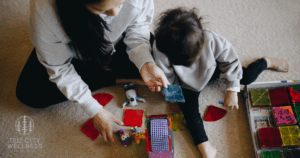If you’re in a relationship where one or both of you has a diagnosis of ADHD, you may have felt the mental and physical load imbalance in ways that are hard to explain, especially when kids are added in the mix. If you feel like you’re constantly arguing over forgotten tasks, misunderstood tone, or unmet needs, you’re definitely not the only couple struggling with the ADHD effects on marriage. This is a surprisingly common occurrence in couples I work with everyday in my therapy office.
In addition to seeing it in couples I work with, I’ve lived it myself, too. My husband was diagnosed with ADHD later in life, right around the time we were preparing to become parents. Looking back, it explained so many of the frustrating patterns we found ourselves stuck in that you might also be familiar with. The missed details, the difference in priorities, the forgetfulness and distraction… these things aren’t happening because your partner doesn’t care. They’re happening because they may have a hidden diagnosis that they haven’t discovered or is not being effectively managed and treated.
It’s really quite alarming how often I come across a couple with this dynamic that doesn’t realize ADHD might be the culprit. ADHD can sneak its way into every corner of your partnership, from your communication, your parenting roles, your sense of fairness and equality… and it can feel like you’re constantly swimming upstream.
At Tree City Wellness, we specialize in helping couples (especially those raising little ones) navigate complex family systems, emotional overload, and the cycles that keep them feeling stuck, including the cycle that often comes with one partner diagnosed with ADHD! Below, we outline five common ways ADHD can impact your marriage and how you can begin to heal, together.
Uneven Distribution of the Mental Load
ADHD primarily impacts executive functioning: Things like planning, remembering, prioritizing, and initiating tasks. This can leave the non-ADHD partner feeling like the default “manager” of everything. You might be parenting the kids and feel like you’re also parenting the relationship AND your partner all at the same time.
Try this: If the ADHD partner is properly diagnosed and in treatment (often medication AND therapy), try to reframe the issue from “laziness” or “not caring” to understanding that executive function struggles are neurologically based. Help create shared systems like visual to-do lists, chore charts, calendar reminders, etc. and agree on who is in charge of follow-through. The ADHD partner can take ownership of household duties in ways that align with their strengths in order to avoid areas where they are likely to become forgetful or distracted.
Frequent Miscommunication
ADHD can effect listening, memory, and regulation of emotions which can mean that things sometimes get missed, reactions feel out of proportion, or the ADHD partner seems tuned out. Like in any relationship, these moments of misattunement can build resentment quickly.
Try this: Slow down before jumping to conclusions. Pause and check in with your partner. Ask a question like, “It seems like you are spacing out right now — is that right or are you lost in thought?” Practice curiosity before taking offense. Allow the ADHD partner to respond and to take accountability for any part that they can be accountable for. If they were dysregulated, perhaps find out what they need to get back to stability, then revisit the conversation. It can also help to schedule important talks ahead of time so there is ability to be prepared and present from both partners.
Parenting Style Conflicts
I often notice very different parenting styles when one partner has an ADHD diagnosis and the other does not. One parent might be the “fly by the seat of my pants” parent while the other is thoughtfully organized and pre-plans for days or even weeks. This undoubtedly causes conflict and neither partner understands their partners intention. The inconsistency can also be confusing for the kids — where one partner is more permissive while the other is more structured.
Try this: What are your shared values when it comes to parenting? What can you both agree wholeheartedly on? If you each have the same goal, but take a different path to get there, is that okay? Is there a place you can meet in the middle? Also think about the emotional health of your children and what’s important to you in how you teach and role model healthy emotions as well as neurodivergence. We all have our quirks and our differences- if you can role model how you two come together despite these differences, you will show your kids that there is more than one path to the finish line, too. That being said, consistency builds trust and stability in families and relationships. For the ADHD partner – Focus on how you can still remain consistent in your approach to parenting, even if it’s not quite as structured as your partners.
Emotional Intensity and Rejection Sensitivity
Many individuals with ADHD experience heightened emotional responses and something called rejection sensitivity– a deep, overwhelming fear of being criticized or rejected. This can lead to frequent arguments or withdrawal from the ADHD partner because they feel like they can “never do anything right.” One reason this happens is likely from years of feeling “different” as a child and making mistakes at home, in school, or in relationships without any reason why. General feedback can become a soft spot for the ADHD diagnosed person.
Try this: Awareness is the first step to change. The ADHD partner needs to become aware and name the cycle. Acknowledge out loud that you are feeling defensive and take a break from the conversation if you need to (just be sure to come back to it and don’t wait too long!). Notice what feelings are typically underneath that defensiveness. Is it fear or shame? Say things like, “I’m not interpreting this conversation well and I need to take a moment to regroup. Can we talk about this tonight after dinner?” It can also help to use co-regulation. If the ADHD partner is feeling defensive, perhaps you can actually reach toward your partner instead of away. Say something like, “I’m feeling attacked right now, but I don’t think that’s your intention. Can you remind me that everything is okay between us before we go any further in this conversation?”
Sexual Intimacy Disruptions
It’s common for people with an ADHD diagnosis to also struggle with some symptoms of anxiety, depression, and/or sensory processing issues– all of which can affect sexual desire and connection. This can sometimes lead to mismatched libidos, avoidance, or pressure that impacts intimacy.
Try this: Talk about intimacy outside the bedroom first: What you like, what you don’t like. Take the pressure off by giving feedback and learning about each other when you’re not in the middle of a heated moment. It’s also okay to plan sex — it doesn’t always have to be spontaneous! Make room for the realities of parenting exhaustion and sensory overload and see if you can find other ways to connect even if sex doesn’t happen. Think outside the box with things like shared laughter, quality time, and physical touch without the pressure of having sex at the end in order to rebuild the emotional safety needed for desire to return.
ADHD Effects on Marriage: There IS Hope
If you’re feeling overwhelmed and under-supported in your marriage because of a diagnosis or possible diagnosis of ADHD with one partner, it doesn’t mean your love is broken. It may mean your strategies need to change, and possibly a diagnosis revealed, and you can start moving toward greater teamwork and connection again. ADHD isn’t a character flaw; it’s a difference in brain wiring. With the right tools and support, couples can move from survival mode to a deeper, more connected way of relating.
At Tree City Wellness, we specialize in working with couples and individuals on healing their relationships. Every day we help couples navigate the complexities of neurodiversity, trauma, attachment wounds, family systems, parenting, and more. You don’t have to do this alone. Reach out for a free 15-minute consultation HERE with one of our therapists today.





